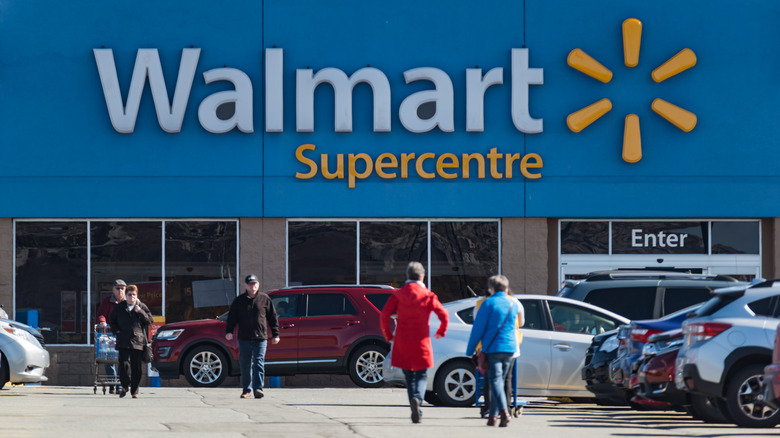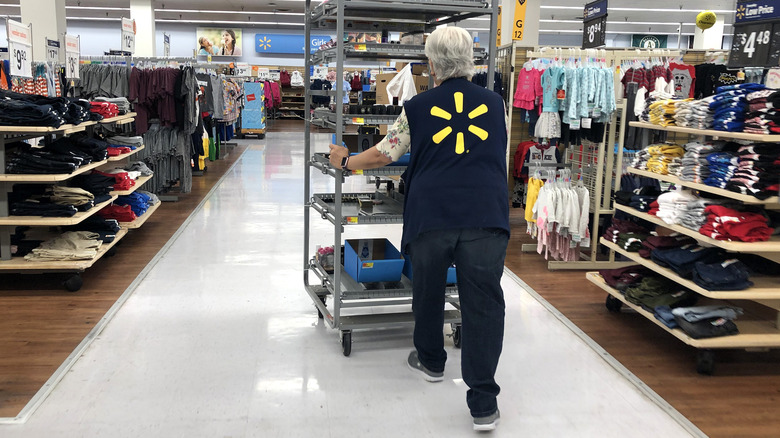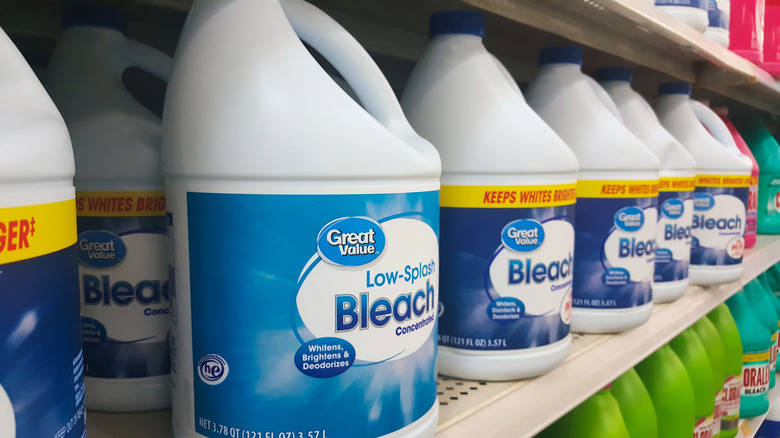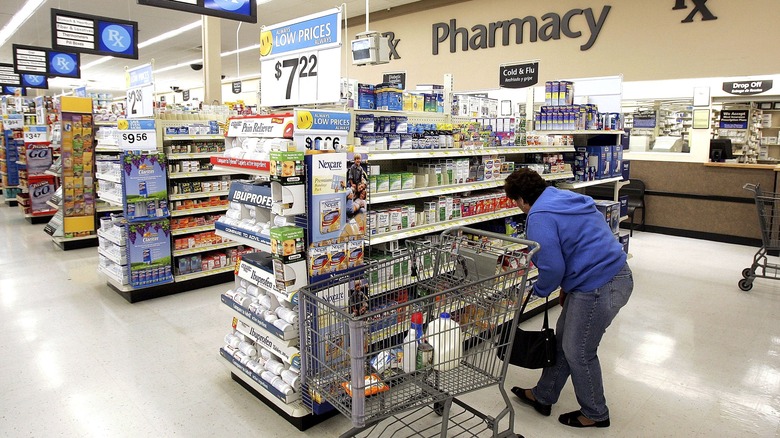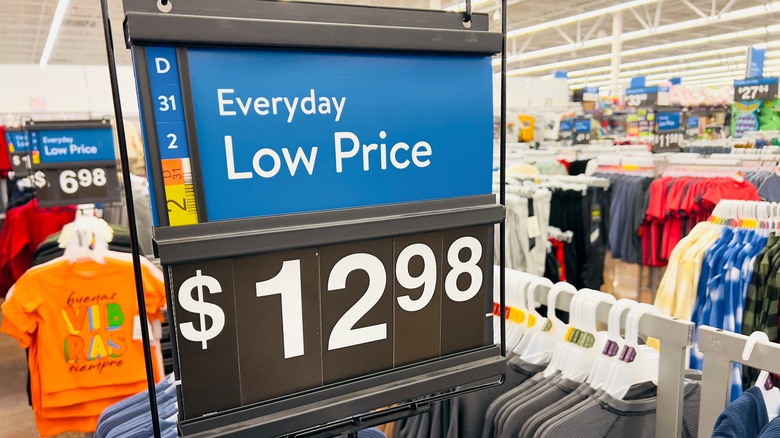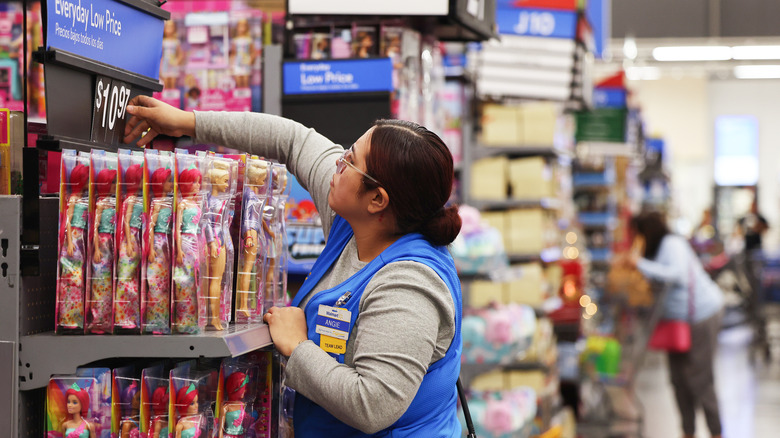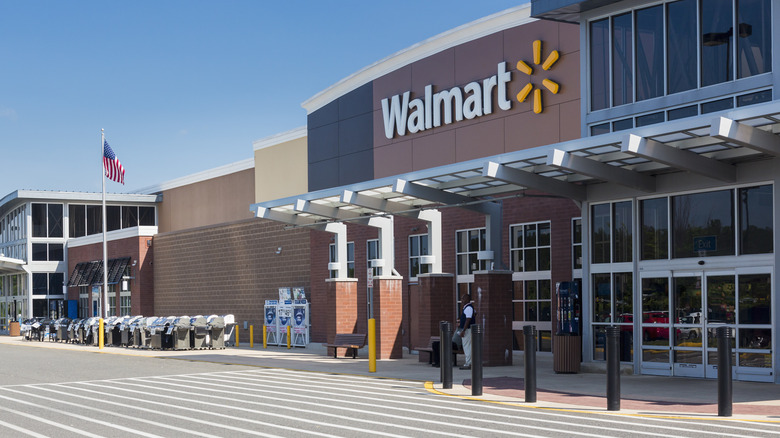The Worst Secrets Of Walmart Exposed
While the likes of McDonald's and Disney may put up a good fight, the title of the most quintessentially American company has to go to Walmart. The grocery store-turned-hypermarket chain boasts well over 3,500 stores nationwide, with a whopping 95% of Americans visiting one of these locations at least twice per year. Stocking everything from fresh produce to clothes, all at wallet-friendly prices (hence its original name of "Wal-Mart Discount City"), Walmart has cemented itself as an everyday staple for millions.
But despite playing such a key part in our day-to-day lives, we wouldn't say Walmart has the most wholesome reputation and it has found itself at the center of its fair share of controversies over the years. While some of these scandals, such as recurrent complaints and debates about Walmart's low hourly wages — which were cut by $1 for some new employees in 2023 — are pretty standard for corporations of this scale, others are much more shocking. Modern media being what it is, it's impossible for Walmart to keep its biggest controversies totally out of the press. However, there are definitely a few incidents and accusations that Walmart most likely wishes had stayed a secret.
It might be listening in on employees and customers
It's a truth universally acknowledged that our phones are listening in on our conversations, but what about Walmart? Back in July 2018, Walmart patented an audio surveillance technology patent titled "Listening to the Frontend." The idea was that Walmart would add sensors to the cashier area to collect audio data. In other words, it would give the store the ability to hear everything that goes down at the checkout.
As per Walmart, this wasn't about listening in on its employees and customers. The patent claimed that it had more to do with improving employee efficiency, guest satisfaction, and cost-cutting. "We're always thinking about new concepts and ways that will help us further enhance how we serve customers, but we don't have any further details to share on these patents at this time," a spokesperson told Buzzfeed.
Regardless, people had some not-so-positive takes on the patent. "When does it cross the line between data efficiency and an outright invasion of privacy?" Neil Stern, then a senior partner at retail consulting firm McMillanDoolittle, told the Washington Post at the time. Questions were also raised about whether Walmart would actually tell people if they were being recorded (something Walmart insisted it would) and the ethics of doing so. While Walmart has never confirmed if it actually introduced the technology into its stores, the idea of it even possibly eavesdropping wasn't taken lightly.
Walmart stores don't always have medical equipment onsite
In some states, having an AED (automated external defibrillator) is a legal requirement in grocery stores. AEDs are devices that are designed to be used to restart someone's heart if they go into cardiac arrest. According to the American Heart Association, AEDs save nine out of 10 people when used in the first minute of cardiac arrest.
Even when an AED isn't legally required, some stores include them regardless. Historically, Walmart has not been one of them. In 2011, a customer died after suffering cardiac arrest in a Walmart parking lot in Missouri, raising questions as to why the store didn't have an AED. Another customer passed away in 2018 at a Walmart in Alberta, Canada. Employees were unsure whether there was an AED onsite (there wasn't, as it transpired) and this delay caused frustration for the customer's family who said they would've checked with another store if Walmart had been able to give them a straight answer.
Walmart clarified in 2011 that it doesn't have AEDs in all of its stores but instead relies on contacting medical professionals in case of emergency. While Walmart hasn't made an official statement on its AED situation in the years since, multiple employees have reported on Reddit that their stores are still sans AEDs. Even in cases where there is an AED, there have been complaints about them being locked, with one employee passing away in 2022 when none could access the locked defibrillator.
It's been accused of racial, gender, and disability discrimination
The list of discrimination lawsuits thrown Walmart's way is lengthy. It has faced multiple accusations of gender discrimination in its time, with greeter Betty Dukes filing a case in 2001 on behalf of up to 1.5 million female Walmart employees, who Dukes claimed were paid less than their male equivalents and unfairly denied promotions. A decade later, the class action suit was thrown out when the Supreme Court decided the plaintiffs didn't have enough in common. It's since fielded plenty more gender discrimination cases.
That's in addition to lawsuits over disability discrimination, one of which saw Walmart ordered to pay $125 million after dismissing an employee with Down Syndrome in 2015. The company has also been accused of racism, including a case in 2020 where a Black customer was ultimately awarded $4.4 million in damages after he said he was racially profiled and harassed by staff at an Oregon store. The U.S. Equal Employment Opportunity Commission (EEOC) sued the company for both racial and gender discrimination in 2022 after the store failed to provide a Black female employee with a sanitary space to pump breast milk, as well as declining to promote her on the assumption that she'd soon quit to be at home with her baby. A shopper filed another lawsuit over accusations of racism in April 2024. The list goes on and on — and it's not a good look for Walmart.
It's allegedly engaged in union-busting in the past
Legally, all employees in the U.S. have the right to unionize. As of 2024, however, none of Walmart's U.S. stores are unionized, with the company accused of using illegal union-busting tactics such as removing pro-union flyers and threatening employees to prevent the unionization of its store in Eureka, California, in January (something the store strongly denied).
This isn't a one-off. At the time of the drama around its Eureka store, Walmart faced at least 21 other complaints from the National Labor Relations Board. Walmart has gained a reputation for discouraging organization at its stores, playing a video that mocks the concept to new hires. According to The Atlantic, this features an actor who says, "I was a union member at my last job. Everyone actually had to join the union ... The thing I remember most about the union is that they took dues money out of my paycheck before I ever saw it, just like taxes."
Walmart has also been accused of distributing anti-union materials to employees for decades. One of its most infamous anti-union conversations arose when a meat department managed to unionize at a Texas Walmart in 2000. Weeks later, the chain announced that it would eliminate butchers and instead use pre-packaged meat at several locations (including that same Texas store). All in all, the chain's sentiment towards organized labor is pretty clear.
Stores have illegally dumped hazardous waste
In 2021, Walmart faced yet another lawsuit. This time, it wasn't related to what goes on inside its stores but rather what it does outside. The grocery store chain was accused of illegally dumping over 1 million toxic items — such as alkaline and lithium batteries, insect killer, cleaning supplies, and electronic waste — in California landfill sites every single year.
A company spokesperson insisted that Walmart would fight the case. However, this was far from the first lawsuit of its kind. In 2013, Walmart pleaded guilty to dumping a pollutant into drains across 16 counties in the Golden State. A year earlier, it paid $1.25 million to Missouri after dumping hazardous waste into landfill. It admitted to doing the same thing in 2010, paying a fine of $25 million.
Unsurprisingly, its track record was brought up in the 2021 lawsuit. "Walmart is a repeat offender of California's hazardous waste laws and this case underscores the importance of dedicating prosecutorial resources to the protection of our environment," said Alameda County District Attorney Nancy O'Malley (via Office of the Attorney General). While Walmart has put a lot of effort into remedying its environmental image in recent years, such as reducing food waste and seeking new ways to source more sustainable beef, blights like this go a long way in marring its reputation.
Walmart was fined for apparently playing a role in the opioid crisis
Since the 1990s, the U.S. has been in the midst of an opioid epidemic. Nearly 500,000 people died from overdoses between 1999 and 2019, with the epidemic's third wave (often regarded as starting in 2013) attributed to an over-prescription of synthetic opioids dispensed at the likes of Walmart, CVS, and Walgreens.
In 2022, Walmart agreed to pay $3.1 billion for its role in the opioid crisis, covering thousands of individual lawsuits. Both CVS and Walgreens agreed to pay more, but Walmart agreed to pay faster. the majority of its payment was made in 2022, with the rest paid in installments through 2028. While Walmart noted that "these settlements are in the best interest of all parties and will provide significant aid to communities across the country in the fight against the opioid crisis," it stressed that they "do not include any admission of liability."
While Walmart didn't prescribe opioids, the argument was that it failed to regulate prescriptions. It later emerged that the consequences were nearly much more serious. Federal prosecutors wanted to charge the company criminally amid claims that Walmart pharmacists in multiple states had complained that they didn't want to dispense the prescriptions from suspicious doctors anymore. However, Walmart compliance officials failed to take action, with an opioid compliance manager telling an executive to focus on "driving sales" (via ProPublica). Ultimately, Department of Justice officials appointed by the Trump administration shut down the case.
It allegedly paid $24 million in bribes to boost its status in Mexico
The U.S. may be its hub, but Walmart is a global company with a presence in the likes of Chile, China, India, and Mexico (some of which sell foods you'll never find in the U.S.). Its foothold in the latter didn't come easy. In 2012, The New York Times exposed a bribery scandal at the heart of the chain's expansion in Mexico, with one former FBI agent finding "reasonable suspicion to believe that Mexican and USA laws have been violated."
As per the report, Walmart de Mexico — Walmart's Mexican and Central American Walmart subsidiary — paid bribes to secure permits, information, and favors that would help the company expand. This included a $52,000 bribe to change a zoning map that would allow Walmart to open a store a mile away from ancient Mayan pyramids in Teotihuacán. Even more alarmingly, once Walmart learned of the situation, it allegedly tried to squash the allegations.
Soon enough, Walmart's expansion in other countries came under scrutiny, too, and the chain launched an internal review. In 2019, the U.S. Securities and Exchange Commission declared that Walmart subsidiaries in Brazil, China, India, and Mexico had all operated without "sufficient anti-corruption" protocols. It was subsequently ordered to pay $144 million to settle SEC charges, plus $138 million to resolve criminal charges. While Walmart wasn't prosecuted, this still proved to be an extremely costly error of judgment for the company.
Multiple controversies have erupted from its supply chain
The April 2013 collapse of the Rana Plaza factory in Bangladesh was a wake-up call for many. With over 1,100 workers killed, it shed light on the exploitative working conditions that often lurk behind fast fashion and cast a shadow over several of the brands sourcing clothes from the factory.
Walmart was one of multiple brands on this list. In the weeks after the collapse, a number of brands and retailers signed The Accord on Fire and Building Safety in Bangladesh, advocating for the safety of garment workers in Bangladesh. Walmart was one of at least 14 retailers that declined, instead insisting that it was working on its own safety program — one which ultimately drew ire from labor advocates. Months later, it also refused to sign a compensation agreement for victims of the collapse alongside the likes of French supermarket chain Carrefour and fashion retailer Mango.
Sadly, this isn't the only time Walmart's clothes have been linked to shady production. Three years after the Rana Plaza collapse, the Asia Floor Wage Alliance released a report claiming that workers making clothes for Walmart in Bangladesh, Cambodia, India, and Indonesia were still facing "intensive labor exploitation and abuse." In 2023, Walmart's supply chain was also linked to a convict garment production program at Colombia's largest women's prison. Walmart may be providing great value to its customers, but the moral price of its offerings is slightly more dubious.
Employees have been denied lunch breaks
In-store employees have often complained about poor working conditions at Walmart. In California, all employees working at least six hours require a 30-minute unpaid lunch break as per a 2001 state law. However, Walmart reportedly flaunted this rule, leading to a massive class-action lawsuit in 2005. While Walmart tried to argue that employees hadn't requested the penalty wages to which they were legally entitled, the jury did not take its side. Walmart was ordered to pay a total of $172 million to 116,000 of its current and former workers but later appealed and agreed to pay between $77 million and $152 million.
Once again, this proved to be part of a larger pattern. In 2009, Walmart agreed to pay $40 million in a similar class action lawsuit in Massachusetts, where 87,000 employees complained about shortened breaks. A similar case was made in Pennsylvania, where Walmart was found to have regularly cut breaks in violation of state law and ordered to pay $188 million in 2014. While we would love to say that the chain seems to have learned its lesson, complaints from employees on Reddit seem to suggest that this problem may not be totally resolved to this day.
There's been controversy around the accuracy of its labels
If you've ever picked up a product emblazoned with "Made in the USA," you may want to double check that claim. Walmart has been caught up in multiple dramas over the accuracy of its labeling. In 2015, for example, it was called out by Truth In Advertising after 100 items on its website were inaccurately labeled as being made in America. Walmart blamed this on its website design, which would've been an easier excuse to swallow if it wasn't accused of the exact same thing in 2021.
This time, Truth In Advertising found that Walmart had described nearly two-thirds of its products as being "Made in the USA" in a Facebook advertisement when only 2,000 items met this requirement on its website. It also claimed that several items supposedly "Made in the USA" featured subtle disclaimers about being made in the U.S. with imported materials. That's despite the Federal Trade Commission's definition of "Made in the USA" requiring products to be "all or virtually all" made in the U.S. and any disclaimers to be clearly written. "Walmart's history of deceptive Made in USA marketing claims on its website now spans more than five years and is exacerbated by consumers' current need/desire to shop online during the global pandemic," Truth In Advertising said. More accusations arose in June 2024, when Walmart was accused of dishonestly labeling aluminum products as "Made in the USA" — and slapped with a class-action lawsuit. The drama continues.
It's faced legal action over its sneaky pricing tactics
A whole other kind of labeling controversy resulted in Walmart being fined $1.64 million in June 2024. The chain had faced accusations of unlawful pricing practices at 64 stores in New Jersey, having used incorrect and inconsistent units of measurement for the same kinds of product, making it tough for customers to accurately compare prices from brand to brand.
Just one month later, criticism around Walmart's labeling deepened when a class-action lawsuit was filed against the chain. This focused on the discrepancies of its price labeling, with Walmart customers allegedly falling victim to a sneaky "bait and switch" tactic to charge more at the checkout than was advertised when they plucked products from the shelves. While Walmart tried to fight the lawsuit by claiming that providing receipts is enough clarification, Circuit Judge David Hamilton argued that it's only fair for customers to expect prices to be consistent from shelf to checkout.
The case cited incidents of pricing inconsistencies in Illinois, Florida, Indiana and New Jersey, but similar issues have previously been reported at stores in North Carolina, where a regulator fined Walmart (plus other stores, such as Target and Dollar Tree) in 2022. If it is a widespread issue, it's something that could potentially impact a huge number of customers — and, even if it's only for a few dollars at a time, can easily add up.
Experts say it avoided paying billions in tax
It feels like most mega corporations make the headlines for supposedly shady tax practices at some point. Walmart's moment came in 2015 when a study by Americans for Tax Fairness claimed that it hid an eye-watering $76 billion of assets in tax havens dotted across the globe. It also alleged that in 2011, Walmart transferred ownership of several international stores to Luxembourg for tax reasons.
Walmart denied this, with a spokesperson claiming that the report was compiled with "incomplete, erroneous information designed to mislead readers" (via The Guardian). The spokesperson also insisted that "this is the same union-supported group that regularly issues similar, flawed reports on Walmart to promote their agenda rather than the facts." (Remember when we were talking about Walmart's stance on unions?)
But despite Walmart's insistence otherwise, more tax avoidance claims emerged in 2019. A former executive claimed that Walmart "improperly avoided" up to $2.6 billion in taxes via a scheme involving a fake Chinese entity (via Quartz). Once again, Walmart denied everything.



